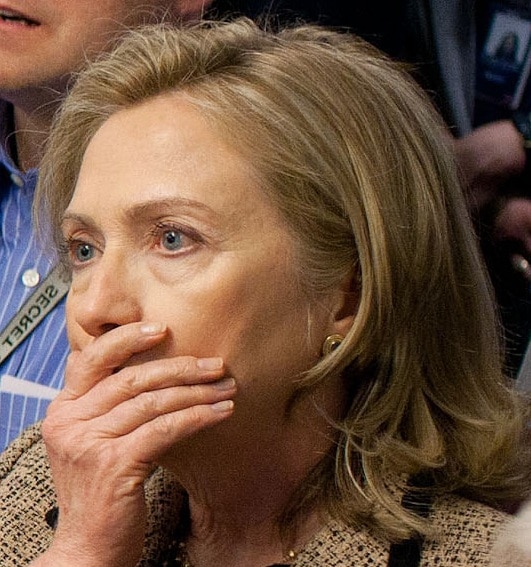Vice President Joe Biden’s announcement a few moments ago that he is not running for president should surprise no one. Pundits, desperate to derail the Clinton coronation, held out hope that by entering the race Biden’s candidacy would at least create the semblance of contest for the Democratic presidential nomination. But as I told The Guardian’s Tom McCarthy in an interview yesterday, Biden was never likely to enter the race because he had no realistic chance of beating Hillary, barring a Benghazi-related smoking email that sent her to the Big House. Given that fact, the logical play for Biden was to fuel speculation that he might run by playing the Hamlet card for as long as he could before the endless media speculation threatened to turn him in a caricature of former New York Governor Mario Cuomo (who in 1992 famously toyed with running for president up until the eve of the New Hampshire primary.)
Make no mistake about it. If Biden saw a path to victory, he would have thrown his hat into the ring long ago. But that path didn’t exist, short of a Clinton indictment. On most issues – with the prominent exception of foreign policy – his views are mostly indistinguishable from her’s. This left him struggling to create a public rationale for a Biden candidacy. Yesterday, at an event honoring former Vice President Walter Mondale, in bid to create such a rationale, Biden went so far as to revise his account of the events leading up to the President’s decision to send in a Seal team to assassinate Osama bin Laden. After previously stating that he had advised against the raid, Biden changed his story yesterday and said he had privately advised the President to pursue the raid on bin Laden’s compound. The changed was apparently a thinly-veiled effort to make the case that on the most important decisions, he was the President’s closest and most trusted confidant – even closer and more trusted than the President’s then Secretary of State Clinton. The gambit exposed just how weak his case for running for president really was. Indeed, except for the additional gravitas afforded him by serving two terms as Vice President, it was never clear why his run for the presidency today would end any differently than his two previous unsuccessful attempts in the 1988 and 2008 cycles*.
Some pundits will point to last Tuesday’s Democratic debate as the tipping point for a Biden candidacy. In the aftermath of Hillary’s strong performance, a number of pundits pontificated that it removed any pretext for a Biden run. But, as I tweeted on social media at the time the debate had no impact on the underlying electoral dynamics which made a Biden run a longshot all along.
Pundits saying debate removes reason for Biden entrance. But there was never any good reason for his entrance. Only pundits wishful thinking
— Matthew Dickinson (@MattDickinson44) October 14, 2015
Instead, what it did was make pundits realize that, their fervent hopes to the contrary notwithstanding, there was never any valid rationale for Biden to run.
So, debate's real impact was to open pundits' eyes to Biden reality. Didn't actually change electoral dynamics. 2/2
— Matthew Dickinson (@MattDickinson44) October 14, 2015
Absent the indictment, Clinton was going to clean his clock, strong debate or no strong debate. All the polling data led to that conclusion, not to mention the other indicators of Clinton’s strength, including money raised and endorsements received. As evidence, note that after more than a month of getting hammered in the press for her emails, Clinton continued to lead her nearest rivals by 20% or more in national polls, and she was using her prodigious fundraising to put together a massive campaign infrastructure that dwarfed her rivals’.
So where does this leave the Democratic race? Precisely where it was before Biden’s announcement: with Clinton firmly in the lead. The latest polls indicate that she has pulled even with Sanders in New Hampshire, buoyed no doubt in part by her debate performance but also by the slew of media ads she has been running there for more than a month. Sanders is yet to get on the air in New Hampshire. Nationally, polls show a slight uptick for Clinton of late, while Sanders’ “surge” seems to have leveled off, although one probably should not drawn any firm conclusions about what might be a short-term fluctuation.

There’s still a long way to go, of course. Sanders, who also did well in Tuesday’s debate, may yet be able to rally enough support to win in Iowa, a caucus state in which Clinton now leads, but which is notoriously difficult to poll. If so, he could conceivably parlay that victory into an upset in New Hampshire. But even then he faces an uphill climb to expand his support beyond the professors/young people/Ben and Jerry’s aging hipster crowd in order to compete against Clinton in states like South Carolina and Nevada that have larger minority populations. But if Sanders is going to beat Clinton, he can’t count on Biden to help him bring her down.
And what of Uncle Joe? In his speech today, Biden acknowledged that, “As my family and I have worked through the grieving process, I’ve said all along what I’ve said time and again to others, that it may very well be that the process by the time we get through it closes the window. I’ve concluded it has closed.” But that is wrong – Biden’s window of opportunity has not closed. It was never open.
*Correction. An earlier version of this post incorrectly stated Biden ran for President in 2000.






